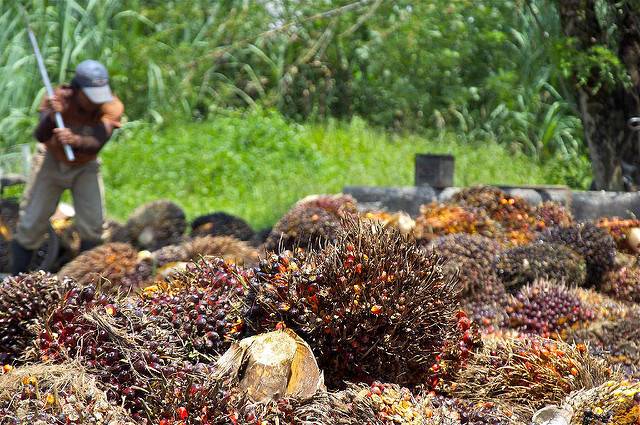
Date: 2025-01-13 Page is: DBtxt003.php txt00014037
Agriculture / Palm Oil
Supply Chain / Working Conditions
Leading Global Palm Oil Supplier Announces Labor Reform
Burgess COMMENTARY
Peter Burgess
Leading Global Palm Oil Supplier Announces Labor Reform

A worker on a palm oil plantation in Malaysia
For both food and consumer packaged goods (CPG) companies worldwide, palm oil has proven to become one of the largest headaches within their supply chains. Many of these problems have been found with palm oil growers, producers and suppliers, as many NGOs have accused them of multiple human rights violations and unchecked deforestation.
One of those companies that has come under increased scrutiny in recent years, IOI Group of Malaysia, announced this week that it has launched three new labor policies that, if successful, could nudge other companies across the global palm oil supply chain to commit to fairer treatment of workers.
First, IOI says it will implement a “no recruitment fee” policy, which has long been a rallying cry for human rights activists. Foreign workers seeking employment at farms or palm oil refineries in Malaysia and Indonesia have often been pressured into paying exorbitant fees to recruiters. Workers would often find themselves stuck as bonded laborers or even subjected to slavery as paying off those fees could take months or even years. To that end, IOI has pledged to pay for the costs accrued while recruiting foreign employees.
“Recruitment agents are responsible for ensuring their sub-agents do not charge any recruitment related fees to the workers,” IOI said in a public statement. “If such fees are found to be charged to the workers, IOI will require the recruitment agents to repay the workers. Furthermore, IOI will suspend our relationship with the agent if this matter is not rectified.”
In addition, IOI said it is now committed to pay all of its workers a minimum wage and overtime as necessary to stay compliant with local regulations. The company said it would also provide incentives that would allow employees to earn another 20 percent on top of their monthly salaries. By the second quarter of 2018, IOI has also promised it would complete a living wage assessment so that it workers could gain a “decent standard of living,” as defined by the Global Living Wage Coalition.
Finally, IOI said it would not stand in the way of labor unions who seek access to the company’s palm oil plantations. NGOs such as the Rainforest Action Network (RAN) have long claimed that the company, in addition to paying below the minimum wage and confiscating workers’ passports, has actively prevented workers from joining trade unions.
Reactions to IOI’s announcement ranged from caution optimism to a wait-and-see attitude. “This does seem promising, and they are solid and important commitments,” said a spokesperson of one environmental group to TriplePundit, adding that the organization needed more time to vet IOI’s policies before they would publicly comment.
One human rights organization in Malaysia, Tenaganita, noted that the elimination of recruitment fees was an important step forward in ensuing that the palm oil industry could provide safe and fair employment for workers.
“Foreign migrant workers in Malaysia’s palm oil industry often face harrowing conditions and suffer under crippling debts due to deception and high fees paid in the recruitment process. IOI Group’s ‘No Fees’ policy sets an important precedent in preventing the debts that keep workers trapped in forced and bonded labor from happening in the first place,” said Glorene Das, Executive Director of Tenaganita in an emailed statement to 3p.
To a Finland-based human rights organization, IOI’s announcement was welcome – but must be followed up with action.
“IOI Group’s commitments are an important first step, but implementation will be the real test. Consumer brand companies and buyers committing to ending forced labor in their supply chains must monitor IOI’s progress and require full implementation of these policies,” said Sonja Vartiala, Executive Director of Finnwatch, in a public statement. “This means, for example, that workers who have paid fees must be reimbursed in full.”
Finnwatch mentioned IOI’s “troubled past.” Last year, the company lost Unilever as a customer after an investigation concluded that it was linked to the destruction of forests and peatlands across Indonesia. The Roundable for Sustainable Palm Oil (RSPO) soon suspended IOI’s membership. Then, the company scored more criticism when it sued the palm oil sustainability standards organization in a Swiss court, only to drop the lawsuit a few weeks later.
The Rainforest Alliance, which has long kept a watchful eye on the palm oil industry, said it was encouraged by this latest announcement.
“These are bold moves from a high-profile company and should be applauded,” said Nigel Sizer, President of the Rainforest Alliance. “Working toward paying a living wage is especially significant and potentially sets a new bar that can transform the lives of workers and their families. Far more attention is needed to the plight of workers in the plantation industry.”
Economics may force IOI’s hand in guaranteeing that these new labor policies actually make a difference for the thousands of workers employed by the company. The growing outcry over the human and environmental tolls exacted by the palm oil industry has made the ingredient a difficult sell unless it can be proven to be deforestation- and slavery-free. One Korea-based palm oil producer, for example, was ready to sell a large harvest earlier this year – but accusations that the same company was responsible for massive deforestation in the remote Indonesian province of Papua meant the company had no takers.
Image credit: Craig Morey/Flickr
Based in Fresno, California, Leon Kaye has written for TriplePundit since 2010. He has lived across the U.S., as well as in South Korea, Abu Dhabi and Uruguay. Some of Leon's work can also be found in The Guardian, Sustainable Brands and CleanTechnica. You can follow him on Twitter (@LeonKaye) and Instagram (GreenGoPost).
FOLLOW LEON KAYE @LEONKAYE
Leave a Reply
Logged in as Peter Burgess. Log out?